
The Whitechapel Bell Foundry was a business in the London Borough of Tower Hamlets. At the time of the closure of its Whitechapel premises, it was the oldest manufacturing company in Great Britain. The bell foundry primarily made church bells and their fittings and accessories, although it also provided single tolling bells, carillon bells and handbells. The foundry was notable for being the original manufacturer of the Liberty Bell, a famous symbol of American independence, and for re-casting Big Ben, which rings from the north clock tower at the Houses of Parliament in London.

St John's Cathedral is the cathedral of the Anglican Diocese of Brisbane and the metropolitan cathedral of the ecclesiastical province of Queensland, Australia. It is dedicated to St John the Evangelist. The cathedral is situated in Ann Street in the Brisbane central business district, and is the successor to an earlier pro-cathedral, which occupied part of the contemporary Queens Gardens on William Street, from 1854 to 1904. The cathedral is the second-oldest Anglican church in Brisbane, predated only by the extant All Saints church on Wickham Terrace (1862). The cathedral is listed on the Queensland Heritage Register.

The Cathedral Church of St David is the Anglican cathedral church located in Hobart, Tasmania, Australia. The cathedral is the mother-church for the Diocese of Tasmania. Consecrated in 1874, St David's is the seat of the Bishop of Tasmania, currently the Right Reverend Richard Condie. The dean is the Very Reverend Richard Humphrey.

St George's Cathedral is the principal Anglican church in the city of Perth, Western Australia, and the mother-church of the Anglican Diocese of Perth. It is located on St Georges Terrace in the centre of the city.
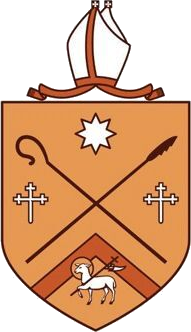
The Anglican Diocese of the Northern Territory covers Australia's Northern Territory and is part of the Province of Queensland in the Anglican Church of Australia.
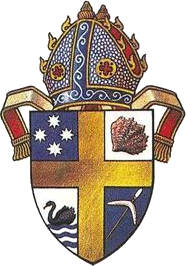
The Anglican Diocese of North West Australia is a diocese of the Anglican Church of Australia, founded in 1910. It is situated in the northern part of the state of Western Australia. As part of the Province of Western Australia, it covers those parts of the state north of Perth including Geraldton, Karratha and Broome and is geographically the largest Anglican diocese in Australia and the largest land-based diocese in the world. The diocese has 18 parishes and three Mission to Seafarers’ ministries; the cathedral church of the diocese is the Cathedral of the Holy Cross, Geraldton.

The St Saviour's Cathedral is the heritage-listed cathedral church of the Anglican Diocese of Canberra and Goulburn in Goulburn, Goulburn Mulwaree Council, New South Wales, Australia. The cathedral is dedicated to Jesus, in his title of Saviour. The current dean is the Very Reverend Phillip Saunders. It was added to the New South Wales State Heritage Register on 20 April 2009.
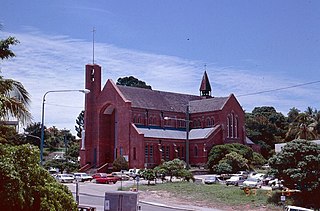
St James' Cathedral is a heritage-listed cathedral of the Anglican Diocese of North Queensland at 36 Cleveland Terrace, Townsville, City of Townsville, Queensland, Australia. It was designed by Arthur Blacket and was built in 1887 by MacMahon & Cliffe. It was added to the Queensland Heritage Register on 21 October 1992.

St John's Cathedral is a heritage-listed, Anglican cathedral in Parramatta, City of Parramatta, Sydney, New South Wales, Australia. St John's was given the status of provisional cathedral of the Anglican Diocese of Sydney in 1969, and designated a Regional Cathedral in 2011 for the Western Region. It was added to the New South Wales State Heritage Register on 5 March 2010.

Christ Church Cathedral is a heritage-listed Anglican cathedral complex at Duke Street, Grafton, Clarence Valley Council, New South Wales, Australia. The cathedral was designed by John Horbury Hunt and built from 1874 to 1884 by Reynold Brothers (brickwork) and G. J. T. Lawson (woodwork). It is also known as Cathedral Church of Christ the King and Grafton Anglican Cathedral. The property is owned by the Anglican Diocese of Grafton. It was added to the New South Wales State Heritage Register on 14 March 2003.
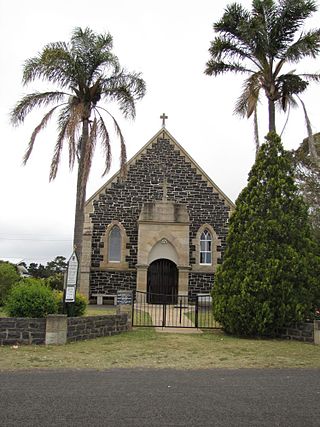
St Matthew's Anglican Church is a heritage-listed church at Beatrice Street, Drayton, once a town but now a suburb of Toowoomba in Toowoomba Region, Queensland, Australia. It was designed by James Marks and built from 1886 to 1887 by Seath, Hobart and Watson. It is also known as St Matthew's Church of England and is the second church of that name in Drayton. It was added to the Queensland Heritage Register on 21 October 1992.

St Mary's Anglican Church is a heritage-listed churchyard at 433, 447 & 449 Main Street, Kangaroo Point, Queensland, Australia. It was designed by Richard George Suter and built in 1873 by Alfred Grant. It was added to the Queensland Heritage Register on 21 October 1992.

The Quetta Memorial Precinct is a heritage-listed Anglican church precinct in Douglas Street, Thursday Island, Shire of Torres, Queensland, Australia. The precinct comprises the All Souls and St Bartholomew's Cathedral Church, the Bishop's House, and the Church Hall. The precinct was built as a memorial to the 134 lives lost in the shipwreck of the RMS Quetta on 28 February 1890. The church was designed in 1892–1893 by architect John H. Buckeridge. It was added to the Queensland Heritage Register on 27 July 2001.

St Agnes Anglican Church is a heritage-listed churchyard at Ipswich Street, Esk, Somerset Region, Queensland, Australia. It was designed by John Hingeston Buckeridge and built in 1889 by Lars Andersen. It is also known as St Agnes Rectory and Church Hall. It was added to the Queensland Heritage Register on 21 October 1992.

Sacred Heart Cathedral is a heritage-listed Roman Catholic cathedral at 266 Stanley Street, Townsville CBD, City of Townsville, Queensland, Australia. It was built from 1896 to 1902 by Dennis Kelleher. It is also known as Church of the Sacred Heart. It was added to the Queensland Heritage Register on 21 October 1992.

St John's Church is a heritage-listed Anglican church at Mundoolun Road, Mundoolun, City of Logan, Queensland, Australia. It was designed by John Hingeston Buckeridge and built from 1901 to 1915. It is also known as Memorial Church of St John the Evangelist. It was added to the Queensland Heritage Register on 26 November 1999.

St Mary's Anglican Church is a State heritage-listed church at 11 Gordon Street, Mount Morgan, Rockhampton Region, Queensland, Australia. It was designed and built in 1888–1889 by Scottish-born Thomas Glen Cornes (1842–1903), superintendent of sawmills and carpenters at the Mount Morgan Gold Mining Company Limited. It was added to the Queensland Heritage Register on 25 August 2000.

Our Lady Queen of Peace Cathedral, also known as Broome Cathedral, is the main place of Catholic worship in the city of Broome, Western Australia, and the seat of the bishop of the Diocese of Broome.
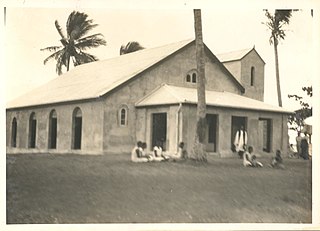
Holy Trinity Church is a heritage-listed Anglican church at Saibai Island, Torres Strait Island Region, Queensland, Australia. It was built from 1917 to 1938. It is also known as Holy Trinity Church of England. It was added to the Queensland Heritage Register on 21 October 1992.

Holy Trinity Anglican Church is a heritage-listed Anglican church at Hampton Street, Roebourne, Western Australia. It is both the oldest stone building and the oldest church in North West Australia. Completed in 1883, and reconstructed in 1894–95 after being destroyed in a cyclone, it was restored over about a decade in the 2010s, during which time it was again severely damaged by a cyclone.





















